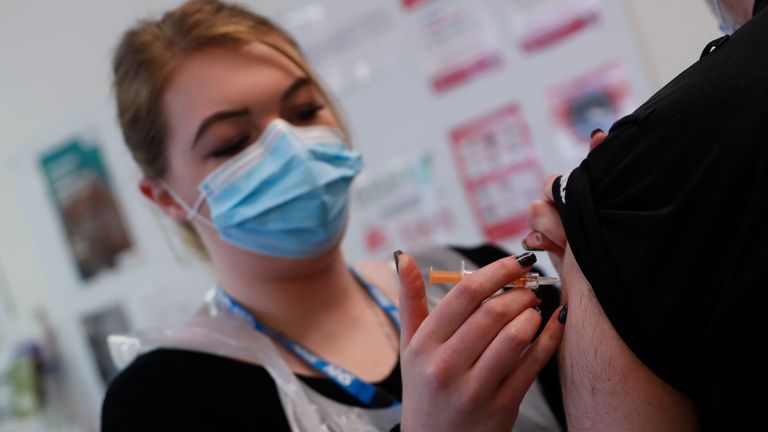The technology used in the Oxford-AstraZeneca COVID jab has been used to design a vaccine that could help treat cancer, scientists say.
Using the same viral vector vaccine technology as the Oxford jab, researchers have designed a two-dose vaccine they hope can target tumours in humans.
When tested in mice, the vaccine increased the numbers of anti-tumour T cells that attack cancerous growths, helping to increase survival rates.
In order to create the treatment, scientists designed their vaccine to target two MAGE-type proteins that are present on the surface of many types of cancer cells.
Please use Chrome browser for a more accessible video player

COVID-19: Booster jabs explained
It is hoped the jab can be used in humans alongside cancer immunotherapy where a patient's T cells are turned against tumours.
Traditionally, Anti-PD-1 immunotherapy is ineffective as some patients have low levels of the T cells needed.
But researchers have found the jab increased levels of the necessary tumour-infiltrating CD8+ T cells, helping to boost the therapy's effectiveness.

Image:The Oxford jab has been given to millions of people around the world. File pic
When the treatments were combined in mice it led to an improved survival rate than the immunotherapy alone.
The Oxford jab
uses an altered, harmless version of a virus that causes the common cold in chimpanzees as a viral vector to deliver SARS-CoV-2 genetic material into the human body.
This prompts the body to make the spike protein - the unique signature of
COVID-19
- which the immune system targets and builds up a response to.
Please use Chrome browser for a more accessible video player

Blood cancer patient on living through the 'best and worst' time of her life
The team developed their two-dose cancer vaccine also using viral vectors, one of which is the same as the vector in the Oxford-AstraZeneca jab.
The research from the University of Oxford and the Ludwig Institute for Cancer Research raises hope the technology could increase survival rates in humans.
A clinical trial will now take place in people with non-small cell lung cancer later this year.
**Follow the Daily podcast on **
**Apple Podcasts, **
**Google Podcasts, **
Spotify,
** Spreaker**
The study, which was done by Professor Benoit Van den Eynde's group at the Ludwig Institute for Cancer Research, in collaboration with co-authors Professor Adrian Hill and Dr Irina Redchenko at the Jenner Institute, is published in the Journal for ImmunoTherapy of Cancer.
Prof Eynde, professor of tumour immunology at the University of Oxford, said: "We knew from our previous research that MAGE-type proteins act like red flags on the surface of cancer cells to attract immune cells that destroy tumours.
"MAGE proteins have an advantage over other cancer antigens as vaccine targets since they are present on a wide range of tumour types.
"This broadens the potential benefit of this approach to people with many different types of cancer."
Director of the Jenner Institute, Prof Adrian Hill, said: "This new vaccine platform has the potential to revolutionise cancer treatment."
 简体中文
简体中文

